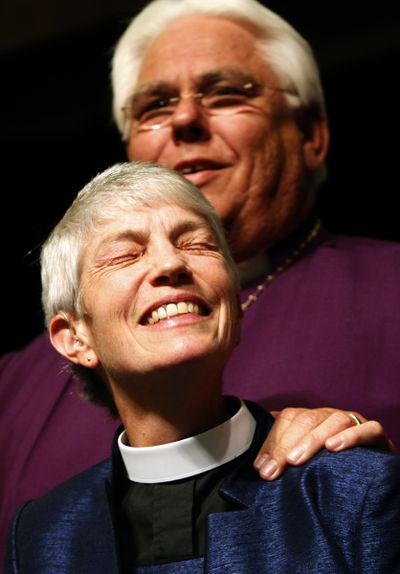L.A. Episcopalians elect first female, gay bishops
Election of homosexual first since moratorium lifted

RIVERSIDE, Calif. – The Episcopal Diocese of Los Angeles on Saturday elected the first openly gay bishop since the national church lifted a ban that kept gays out of its highest ordained ministry, a move that deepened divisions between liberals and conservatives in the faith.
Clergy and lay leaders, meeting in the Southern California city of Riverside for their annual convention, chose the Rev. Canon Mary D. Glasspool, 55, who has been in a committed relationship with a woman since 1988, from a field of six candidates.
Glasspool’s election to fill one of two openings for suffragan, or assistant, bishop followed the selection Friday of the Rev. Canon Diane Jardine Bruce, 53, the rector of a San Clemente church. The two became the first women elected as bishops of the diocese in its 114-year history.
“Two women and one of them is gay – I just think that’s great,” said Diana Rising, a member of St. Luke’s Episcopal parish in La Crescenta, where the diocese recently evicted a conservative congregation that had broken away from the church.
Glasspool’s election riveted much of the convention as well as the worldwide Anglican Communion, of which the Episcopal Church is the U.S. branch. Glasspool – a canon, or senior assistant, to the Diocese of Maryland bishops – won the Los Angeles post on a seventh ballot.
Afterward, Glasspool said she believed the voters did not base their decision simply on sexual orientation or any other single characteristic of the candidates.
“I believe the people of the diocese, by the grace and power and influence of the Holy Spirit, went beneath skin deep, went beneath the superficial characteristics and boxes into which we put people, to really look at individual people,” she said.
Glasspool is the first openly gay priest to be elected bishop since the Rt. Rev. V. Gene Robinson of New Hampshire in 2003.
Robinson’s election threw the church and the Anglican Communion into an uproar, prompting the members of dozens of conservative parishes and four dioceses to vote to leave the church. It also led to the moratorium on additional gay bishops.
Opponents of gays in the church leadership said they were disheartened by Glasspool’s election but had been expecting it.
“I can’t say it surprises me,” said the Rt. Rev. Mark Lawrence, bishop of the South Carolina Diocese, which has recalled some representatives to the national church’s councils to protest the policies on gays.
He said the split in the church is likely to endure: “Is there anything that can be done to bridge it? No one has come up with it yet.”